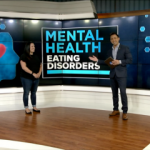
How To Maintain Eating Disorder Recovery While in College
By guest author: Caroline L. Young, MS, RD, LD, RYT (she/her)
The college years present a whirlwind of changes and challenges. And, for students recovering from eating disorders, campus life can be a perfect storm of potentially triggering situations. Fortunately, with planning, consistency, and support, maintaining recovery from an eating disorder while in college is possible. Keep reading to learn more about protecting eating disorder recovery while in college
Eating Disorders Among College Students
Eating disorders among college students are disturbingly prevalent. National Eating Disorders Association (NEDA) estimates that between 10 and 20% of women and 4 to 10% of men in college suffer from an eating disorder, and rates are rising.
The prevalence of eating disorders among college students increased sharply in 2021, partly due to lockdowns, social distancing, and other COVID-related stress and anxiety.
But I have good news—maintaining recovery in college is possible. As an ED dietitian, I’ve seen countless clients go away to college, ride the recovery rollercoaster amidst significant change, and emerge with even more resilience than before.
For that matter, thriving in college is possible if you prioritize your well-being. Move into the new chapter armed with awareness, support, and strategies in place to keep you on track.
College Eating Disorder Triggers and Challenges
Whether heading to school for the first time or returning after a treatment break, anticipating and planning for potential recovery obstacles will go a long way toward eating recovery maintenance and relapse prevention.
Food Insecurity
Food insecurity, or not having reliable access to adequate food, is prevalent on college campuses, and research shows that people living with high levels of food insecurity are at greater risk for exhibiting some eating disorder behaviors and developing eating disorders.
One 2021 study in the International Journal of Eating Disorders shows a clear link between food insecurity and eating disorder symptoms, diagnoses, and related impairment. Another 2019 study in the American Journal of Health Promotion shows food insecurity is negatively associated with academic performance and graduation rates.
Growing research shows US college students with high levels of food insecurity with rates between 33 and 51 percent, compared to US adults with rates around 10 percent of the population.
“Many [college students] are on loans or scholarships and are barely making it financially,” explains Lauren Chaffin, MS, RD, LD. “All these factors set up a ripe environment for eating disorders to thrive.”
Diet Culture and Weight Stigma
“College campuses can be filled with triggers related to body image, diet culture, weight stigma, and food, which can exacerbate negative thoughts and behaviors associated with EDs,” says dietitian Wan Na Chun, MPH, RD, CPT of One Pot Wellness.
For example, the “freshman 15,” a popular joke among college students, refers to the dreaded weight many (if not most) students gain during their first year at school. “Most college-aged people are not yet finished growing into their full adult body,” Chaffin explains, “Diet culture jabs like ‘freshman 15’ can be very distressing to some when, in reality, this is likely necessary growth into adulthood.”
In my practice, I hear about endless accounts of weight stigma—negative beliefs and actions toward people in larger bodies—on college campuses. Weight-based biases infiltrate cafeterias, classrooms, dorms, Greek life, and fitness classes. College campuses should feel welcoming and inclusive to people of all shapes and sizes, and dorms should feel like a home away from home.
Research shows that while college students of all genders can be impacted by eating disorders, those living in larger bodies may be at elevated risk for developing eating disorder behaviors. One reason for this is the pervasiveness of fatphobia and other stigmas.
New Routine, New Environment
Routines are extremely valuable for those in recovery. Mapping out a new recovery-aligned college routine isn’t easy, and getting all the kinks worked out will take patience and practice.
Practicing tried and true eating disorder recovery skills in a new environment presents its own set of challenges, including the challenge of adapting your nourishment routine.
“College dining halls often present an abundance of food choices, varied eating times, and buffet-style settings,” Draayer says. “This can be overwhelming for someone trying to maintain a structured eating plan while navigating social pressures around eating in public.”
Co-Occurring Mental Health Conditions
A majority of those with eating disorders struggle with at least one other mental health condition, such as depression, anxiety, and substance use disorders- the onset of which often take place in college-aged individuals. Failure to address co-occurring mental health conditions, especially during a time of transition, can pose a real threat to eating disorder recovery.
“College itself is stressful enough, with how much cost is involved and how much pressure there is to do well,” Chaffin says, “much less when on top of that you are trying to take care of yourself as a recovering adult human for the first time ever.”
The drastic change and pressure could lead to or worsen co-occurring conditions like anxiety and depression, according to dietitian Kristin Draayer, MS, RDN. “The transition to college life often coincides with an increase in anxiety and depression, which can exacerbate restrictive eating behaviors or trigger isolation,” she says.
Other co-occurring issues like insomnia, substance abuse, and post-traumatic stress disorder (PTSD) can threaten eating disorder recovery. A 2019 study of college women with eating disorders in American Journal of College Health showed a link between anxiety and insomnia symptoms and increased eating disorder symptom severity. Another 2020 study in European Eating Disorder Review showed an association between PTSD and bulimia symptoms and a connection between PTSD and binge eating and body dissatisfaction.
College life also tends to be rife with various kinds of social, academic, and even athletic competition. This environment can trigger old eating disorder thoughts, particularly in individuals with perfectionistic tendencies. While perfectionism isn’t a diagnosis, it’s a common trait among those with obsessive-compulsive disorder and often co-occurs with eating disorders.
In my college clients, I’ve seen perfectionism rear its ugly head when they’re confronted with social and academic pressure and competition at school. One 2017 study of college women in Eating and Weight Disorders showed a higher prevalence of eating disorder behaviors, including dieting and food rigidity, in those who feel the need to appear perfect compared to those with low levels of perfectionism.
Unreadiness
“There may be pressure to leave treatment to align with the academic calendar, but a hasty exit could be counterproductive,” Draayer explains. “Assessing whether the student is ready for this change is important.”
Eating disorder recovery cannot be sustained without a strong foundation. As tempting as it may be to leave treatment early, it’s essential to respect your recovery’s unique timeline. Trust the process. Receiving a “full dose” of care will better prepare you to navigate eating disorder triggers at school with a reduced likelihood of relapse. Waiting until you are medically, clinically, and emotionally ready for college is an act of self-compassion.
Coping With College Eating Challenges
Now that we’ve reviewed college eating recovery challenges let’s look at some of the tools and resources available to support your recovery maintenance while in school.
Supplement and Stretch Your Food Budget
Not only is having enough food vital for your recovery but it’s also needed to support your academic achievement and ability to focus in class. If resources are limited, and you’re worried about having enough food to eat, see if your campus has a program for enrolling in Supplemental Nutrition Assistance Program (SNAP), a food pantry, or catering leftover services. “Students can ask counselors for a list of local food banks,” suggests dietitian Melissa Atman-Traub, MS, RDN, LDN. “Some may have a campus garden that provides food.”
Plant-based proteins (like peanut butter and beans) and canned or frozen fruits and veggies can really help you stretch your grocery budget. “There are a few apps [like Too Good to Go] that list restaurants and stores that give away extra food at the end of the day for very cheap,” adds dietitian Moushumi Mukherjee, MS, RDN.
Tune Diet Culture Out. Embrace Weight Inclusivity and Intuitive Eating
Despite diet culture’s pervasiveness, anti-diet movements like Health at Every Size (HAES) and intuitive eating are gaining traction. Research shows that HAES and intuitive eating interventions are associated with reduced disordered behaviors in college students. One 2020 study in the International Journal of Eating Disorders linked body appreciation and intuitive eating to a lasting and complete recovery in college kids. Another 2019 study of college students in Eating Behaviors showed intuitive eating as a potential protective against weight-related shame.
Be intentional about surrounding yourself with recovery-aligned influences and educational resources such as books and podcasts. At the same time, remain vigilant and beware of diet culture ideas, like “saving up” calories to consume alcohol. Remember to vocalize your boundaries and remind people of them if they forget. Don’t forget to extend these boundaries to social media usage. Unfollow accounts that promote diet culture and social comparison just as you’d walk away from people who cause you to stumble in your recovery.
Stay In Touch with Your Team
COVID definitely showed us that isolation is a breeding ground for eating disorder thoughts. At the same time, the pandemic also highlighted how technology can play a powerful role in allowing us to stay connected
Going away to school and moving doesn’t have to mean saying goodbye to your providers and other members of your support network. Ask your dietitian, therapist, and/or psychiatrist about seeing them virtually if you’re not already doing so. If that’s not possible, ask them to help you identify with a new provider near campus (at your school or a nearby treatment center). If you need regular medical visits, visit the campus health clinic and work with your dietitian and doctor to coordinate care.
Remember to stay connected to other members of your support network, such as your biological and chosen family. Your new college friends won’t necessarily replace your old relationships, which can help you stay anchored in your truth. The safe people in your life are still in your corner, and staying connected will help. “Reaching out to support people when things get difficult or when urges are high can mean the difference between engaging in urges or not,” Chaffin says.
Find Your Eating Recovery Community
Loneliness is a risk factor for eating disorder relapse. Since eating disorders thrive in isolation, put yourself out there and find your people! Ask your roommate to watch a movie or your lab partner to grab a coffee. Visit places where there are bound to be people with common interests, like a drama or knitting club. Making new connections is hard, but learning to build new healthy relationships is incredibly valuable in recovery.
Draayer points out that joining a club or group can help you separate from your eating disorder. “College is a great time to explore new hobbies, interests, and relationships,” she explains. “Actively participating in extracurricular activities can help you develop an identity beyond food, body image, or eating disorder.”
Make A Flexible Food Plan
When I work with college-bound clients, we make weekly grocery lists and daily meal structures, which are helpful tools to foster stability. If clients eat in dining halls, we create a plan that works with their schedules and prevents overwhelm. Work with your provider to develop a game plan to support your food freedom within your new routine.
“Determine eating times and locations that fit your class schedule, and plan to have suitable options available,” Draayer suggests. “It may also be helpful to prepare by going to self-serve restaurants with support before college to get a feel for it and prepare for any challenges.”
Hone Your ED Recovery Coping Skills
Yoga, breathwork, and meditation saved me from panic attacks during my freshman year of college. Research shows mindfulness practices like meditation and reflection can help lower psychological distress during college exams. See if your school’s recreation center offers any mindfulness-based classes or recovery-aligned support groups.
Not a “mindfulness person?” Brush off your old coping toolbox from treatment or therapy and remind yourself of your options. Talk to your therapist about new coping methods if the old ones feel stale. Some of my favorite coping skills for my college clients include finding comforting objects from home or your family life (such as seashells from a beach trip or a picture of your dog) and keeping them close, nervous system work (including using an ice pack for regulation when feeling anxious or depressed), and painting or drawing to express feelings.
Prioritize Self-Care Like It’s Your Job
I don’t mean take a bubble bath (although if that helps you go for it). Genuine self-care is whatever helps you feel your best, and there are endless forms of practicing it. Self-care promotes mental health hygiene. At its simplest, self-care is about getting your basic physical and emotional needs met. “This includes cleanliness, food access, water intake, sufficient sleep, stress management, and the like,” explains Chaffin.
Wait Until You’re Ready
If you aren’t prepared medically, emotionally, or mentally to head off to college, honor that. “One option is to defer enrollment for a semester or a year to focus on recovery,” Draayer says. “Alternatively, attending a local or community college while living at home can provide a more structured environment conducive to recovery.”
Zoom out and look at the bigger picture—if your dream is to go away to school, putting your recovery first now will only help you get there. If you need to take a break from school, ask your provider if they can provide letter templates to help you explain your situation to the college administration.
Warning Signs of Relapse
If you have a loved one working to maintain their recovery at college, know that your support has never been more critical. Check-in with your loved one regularly, and offer non-judgmental support if you notice any of the following signs of struggle:
- Rigid behaviors around food and exercise, like calorie counting and fitness tracking
- Personality or mood changes
- Weight fluctuations
- Isolating
- Change in clothing style
- Comments on weight, food, or body
- Withdrawal from activities or classes
- Drop in grades
If you notice signs that your loved one’s recovery may be at risk, address your concerns with nonjudgement and loving directness. “Parents and loved ones can support students by expressing concern, educating themselves, encouraging professional help, and avoiding judgment and criticism,” Chun says.
If you don’t already have a relapse prevention plan, create one now with your loved one and the rest of their team. “It can be helpful for loved ones to know what to be looking for and asking in their specific situation,” Chaffin explains. “This should be guided and led by the person in recovery primarily, possibly with the help of their care team.”
Recovery Resources Available For College Students
There’s nothing like common humanity in the healing process. As you prepare for college, check out your School’s support group options or look for a virtual group to join, like one offered by Alsana or ANAD.
Virtual eating disorder treatment programs are another excellent resource for college students due to their flexible scheduling options.
Draayer suggests consulting your team for a list of helplines and vetted online chat services. “These options offer immediate and flexible support, suitable for the varying schedules and challenges of college students,” she adds.
Like any big life transition, going to college can test your recovery, but it doesn’t have to destroy it; it may even help to enhance it. So, put on your armor of awareness, endless support options, and recovery tools, and tell yourself, “I’ve got this.”







